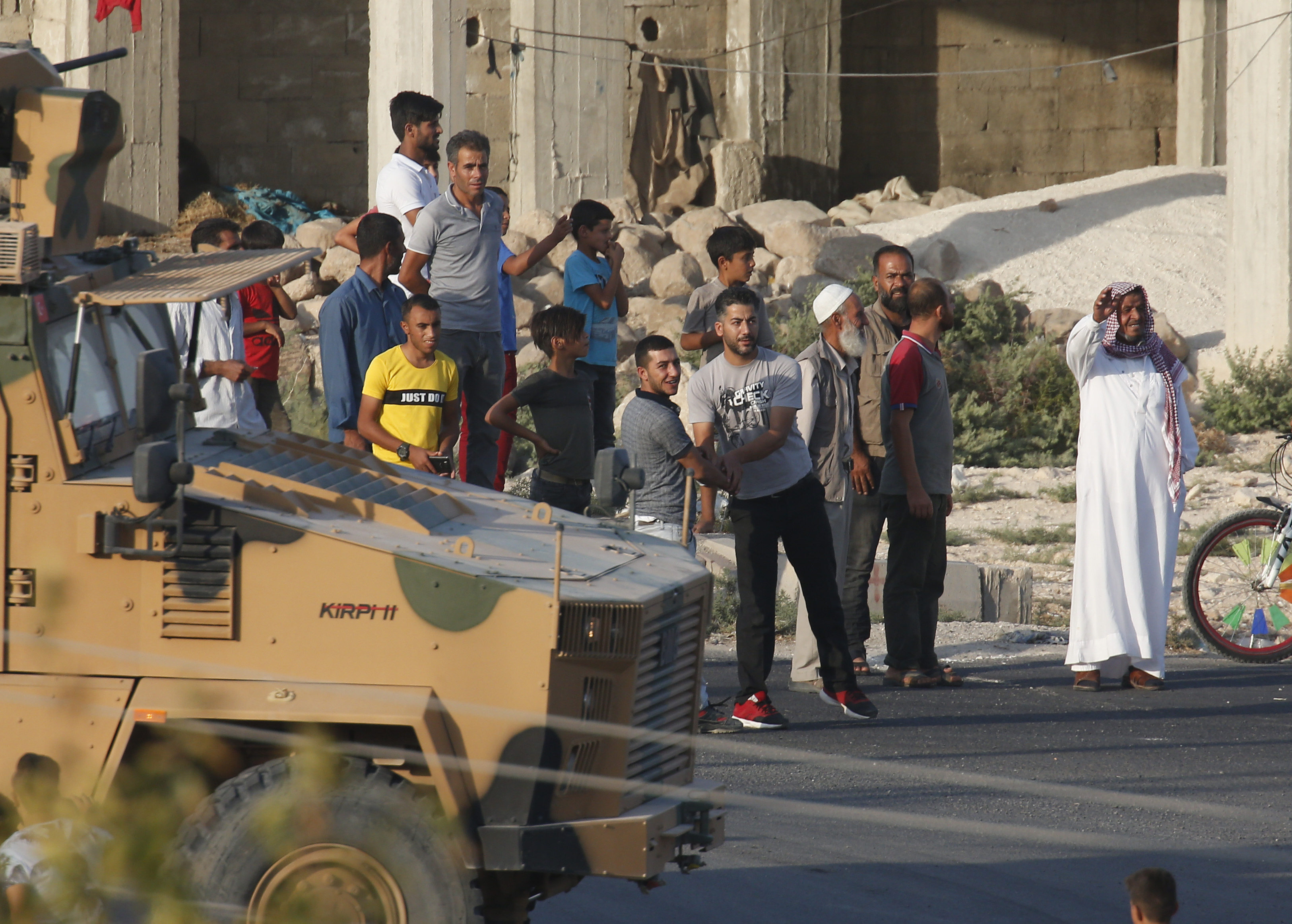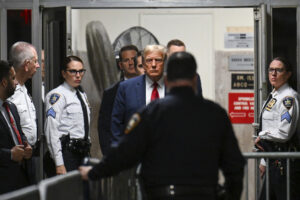Turkey Launches Offensive Against Kurdish Fighters in Syria
Airstrikes hit near the northern border after President Trump shifts U.S. policy, essentially abandoning the Syrian Kurdish fighters. People watch as a Turkish military convoy moves through Akcakale, Turkey, near the border with Syria on Wednesday shortly after the start of a Turkish operation inside Syria against Kurdish fighters. (Lefteris Pitarakis / AP)
People watch as a Turkish military convoy moves through Akcakale, Turkey, near the border with Syria on Wednesday shortly after the start of a Turkish operation inside Syria against Kurdish fighters. (Lefteris Pitarakis / AP)
AKCAKALE, Turkey — Turkey launched a military operation Wednesday against Kurdish fighters in northeastern Syria after U.S. forces pulled back from the area, with a series of airstrikes hitting a town on Syria’s northern border.
Turkish President Recep Tayyip Erdogan announced the start of the campaign, which followed an abrupt decision Sunday by U.S. President Donald Trump that American troops would step aside to allow for the operation.
Trump’s move represented a shift in U.S. policy that essentially abandoned the Syrian Kurdish fighters who have been America’s only allies on the ground in Syria. They were longtime U.S. allies in the fight against the Islamic State group.
After Turkey’s offensive began, there was sign of panic in the streets of Ras al-Ayn— one of the towns under attack with residential areas close to the borders. Cars raced to safety, although it was not clear if they were leaving the town or heading away from border areas. Near the town of Qamishli, plumes of smoke were seen rising from an area close to the border after activists reported sounds of explosion nearby.
The Kurdish forces have warned of a “humanitarian catastrophe” that could potentially unfold because of the Turkish military operation.
“Our mission is to prevent the creation of a terror corridor across our southern border, and to bring peace to the area,” Erdogan said in a tweet.
He added that Turkish Armed Forces, together with Turkish-backed Syrian fighters known as the Syrian National Army, had begun what they called “Operation Peace Spring” against Kurdish fighters to eradicate what Erdogan said was “the threat of terror” against Turkey.
Minutes before Erdogan’s announcement, Turkish jets began pounding suspected positions of Syrian Kurdish forces in the town of Ras al Ayn, according to Turkish media and Syrian activists. The sound of explosions could be heard in Turkey.
A photograph released to Turkish media showed Erdogan at his desk, reportedly giving orders for the start of the operation.
It was difficult to know what was hit in the first hours of the operation.
Mustafa Bali, a spokesman for the U.S.-backed Kurdish-led Syrian Democratic Forces, said Turkish warplanes were targeting “civilian areas” in northern Syria, causing “a huge panic” in the region.
Before Turkey’s attack, Syrian Kurdish forces that are allied with the United States issued a general mobilization call, warning of a “humanitarian catastrophe.”.
The Turkish operation meant to create a so-called “safe zone” carries potential gains and risk for Turkey by getting even more deeply involved in the Syria war. It also would ignite new fighting in Syria’s 8-year-old war, potentially displacing hundreds of thousands.
Turkey has long threatened to attack the Kurdish fighters whom Ankara considers terrorists allied with a Kurdish insurgency in Turkey. Associated Press journalists on the Turkish side of the border overlooking Tal Abyad saw Turkish forces crossing into Syria in military vehicles Wednesday.
Expectations of an invasion increased after Trump’s announcement, although he also threatened to “totally destroy and obliterate” Turkey’s economy if the Turkish push into Syria went too far.
Turkey has been massing troops for days along its border with Syria and vowed it would go ahead with the military operation and not bow to the U.S. threat.
Trump later cast his decision to pull back U.S. troops from parts of northeast Syria as fulfilling a campaign promise to withdraw from the “endless war” in the Middle East. Republican critics and others said he was sacrificing an ally, the Syrian Kurdish forces, and undermining Washington’s credibility.
Fahrettin Altun, the Turkish presidency’s communications director, called on the international community in a Washington Post op-ed published Wednesday to rally behind Ankara, which he said would also take over the fight against the Islamic State group.
Turkey aimed to “neutralize” Syrian Kurdish militants in northeastern Syria and to “liberate the local population from the yoke of the armed thugs,” Altun wrote.
Erdogan discussed plans for the incursion with Russian President Vladimir Putin. Erdogan’s office said the Turkish leader told his Russian counterpart by phone that the planned military action in the region east of the Euphrates River “will contribute to the peace and stability” and also “pave the way for a political process” in Syria.
In its call for a general mobilization, the local civilian Kurdish authority known as the Autonomous Administration of North and East Syria, also asked the international community to live up to its responsibilities as “a humanitarian catastrophe might befall our people.”
The Kurds also said that they want the U.S.-led coalition to set up a no-fly zone in northeastern Syria to protect the civilian population from Turkish airstrikes.
The U.S.-backed Syrian Kurdish group urged Moscow to broker and guarantee talks with the Syrian government in Damascus in light of Turkey’s planned military operation. The Syrian Kurdish-led administration said in a statement it is responding positively to calls from Moscow encouraging the Kurds and the Syrian government to settle their difference through talks.
Syria’s Foreign Ministry condemned Turkey’s plans, calling it a “blatant violation” of international law and vowing to repel an incursion. Although it blamed some Kurdish groups for what is happening, saying they were being used as a tool to help an alleged “American project,” it said Syria is ready to welcome back its “stray sons if they return to their senses,” referring to the pro-U.S. Kurdish fighters.
Russian Foreign Minister Sergey Lavrov accused Washington of playing “very dangerous games” with the Syrian Kurds, saying that the U.S. first propped up the Syrian Kurdish “quasi state” in northeastern Syria and is now withdrawing its support.
“Such reckless attitude to this highly sensitive subject can set fire to the entire region, and we have to avoid it at any cost,” he said during a visit to Kazakhstan. Russian news media said Moscow communicated that position to Washington.
Earlier Wednesday, IS militants targeted a post of the Kurdish-led Syrian Democratic Forces in the northern Syrian city of Raqqa, which was once the de facto IS capital at the height of the militants’ power in the region.
The SDF, which is holding thousands of IS fighters in several detention facilities in northeastern Syria, has warned that a Turkish incursion might lead to the resurgence of the extremists. The U.S.-allied Kurdish-led force captured the last IS area controlled by the militants in eastern Syria in March.
In the IS attack, three suicide bombers struck Kurdish positions in Raqqa. There was no immediate word on casualties. An activist collective known as Raqqa is being Silently Slaughtered reported an exchange of fire and an explosion.
The Observatory said the attack involved two IS fighters who engaged in a shootout before blowing themselves up.
IS claimed responsibility, saying one of its members killed or wounded 13 SDF members.
Also Wednesday, Iranian state TV reported a surprise military drill with special operations forces near the country’s border with Turkey, in Iran’s Western Azerbaijan province. The TV didn’t mention the expected Turkish offensive into Syria or elaborate on the reasons for the drill.
___
Mroue reported from Beirut. Associated Press writers Suzan Fraser in Ankara, Turkey; Mehmet Guzel in Akcakale, Turkey; Nasser Karimi in Tehran, Iran; and Nataliya Vasilyeva in Moscow contributed.
Your support matters…Independent journalism is under threat and overshadowed by heavily funded mainstream media.
You can help level the playing field. Become a member.
Your tax-deductible contribution keeps us digging beneath the headlines to give you thought-provoking, investigative reporting and analysis that unearths what's really happening- without compromise.
Give today to support our courageous, independent journalists.






You need to be a supporter to comment.
There are currently no responses to this article.
Be the first to respond.